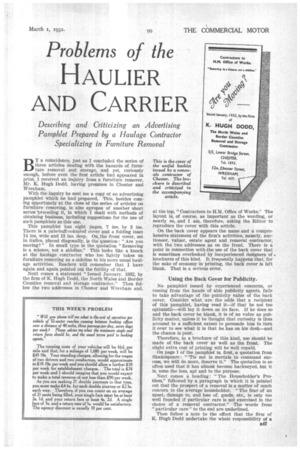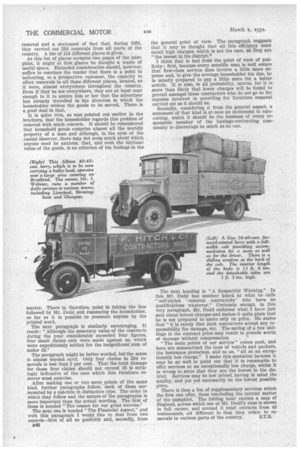Problems of the
Page 65

Page 66

If you've noticed an error in this article please click here to report it so we can fix it.
HAULIER AND CARRIER
BY a coincidence, just as I concluded the series of three articles dealing with the hazards of furniture removal and storage, and yet, curiously enough, before even the first article had appeared in print, I received an inquiry from a furniture remover, Mr. K. Hugh Dodd, having premises in Chester and Wrexham.
With the inquiry he sent me a copy of an advertising pamphlet which he had prepared. This, besides corning opportunely at the close of the series of articles on furniture removing, is also apropos of another short series 'preceding it, in which I dealt with methods of obtaining business, including suggestions for the use of such pamphlets as this one.
This pamphlet has eight pages, 7 ins. by 3 ins. There is a pale-buff-coloured cover and a folding inset 14 ins, wide and 13 ins. deep. Okthe front cover, set in italics, placed diagonally, is the question: "Are you moving?" In small type is the quotation "Removing is a science, not a sideline." This looks like a knock at the haulage contractor who too lightly takes on furniture removing as a sideline to his more usual haulage activities. Readers will remember that I have again and again pointed out the futility of that. Next comes a statement "Issued January, 1932, by the firm of K. Hugh Dodd, the North Wales and Border Counties removal and storage contractor." Then follow the two addresses in Chester and 'Wrexham and,
at the top, "Contractors to KM. Office of Works." The layout is, of course, as important as the wording, or nearly so, and I am, therefore, asking the Editor to reproduce the cover with this article.
On the back cover appears the name.and a comprehensive statement of the firm's activities, namely, auctioneer, valuer, estate agent and removal contractor, with the two addresses as on the front. There is a point in connection -with the use of the back cover that is sometimes overlooked by inexperienced designers of brochures of this kind. It frequently happens that,"for the sake of economy in printing, the back cover is left blank. That is a serious error.
Using the Back Cover for Publicity.
No pamphlet issued by experienced concerns, or coming from the hands of able publicity agents, fails to take advantage of the publicity value of the back cover. Consider what 'are the odds that a recipient of this pamphlet, having read it—if that be not too optimistic—will lay it down on its face. If he does so and the back cover be blank, it is of no value as publicity matter, unless it be thought that curiosity is thus aroused to a sufficient extent to persuade him to turn it over to see what it is that he has on his desk—and the chance is poor.
Therefore, in a brochure of this kind, use should be made of the back cover as well as the front. The slight extra cost of printing will be well repaid. On page 1 of the pamphlet is, first, a quotation from Shakespeare: " 'Tis not in mortals to command success, we will do more, deserve it." The quotation is so often used that it has almost become hackneyed, but it is, none the less, apt and to the purpose.
Next comes a heading: "The Householder's Problem," followed by a paragraph in which it is pointed out that the prospect of a removal is a matter of much concern to the average householder. "The fear of an upset, damage to, and loss of, goods, etc., is only too well founded if particular care is not exercised in the choice of a removal contractor." The wards from "particular care" to the end are underlined.
Then follow a note to the effect that the firm of K. Hugh Dodd undertake the whole responsibility of a E47
removal and a statement of fact that, during 1931, they carried out 234 removals from all parts of the country. A list of 114 different places is given.
As this list of places occupies two pages of the pamphlet, it might at first glance be thought a waste of useful space. Extended consideration should, however, suffice to convince the reader that there is a point in indicating, to a prospective customer, the capacity to effect removals to all these different places, located, as it were, almost everywhere throughout the country. Even if they be not everywhere, they are at least near enough to it to assure him or her that the advertiser has already travelled in the direction in which the householder wishes the goods to be moved. There is a good deal in that.
It is quite true, as was pointed out earlier in the brochure, that the householder regards this problem of removal with much concern. It should be remembered that household goods comprise almost all the worldly property of a man and although, in the eyes of the casual observer, there may not seem much about which anyone need be anxious, that, and even the intrinsic value of the goods, is no criterion of his feelings in the matter. There is, therefore, point in taking the line followed by Mr. Dodd and reassuring the householder, so far as it is possible to reassure anyone by the printed word.
The next paragraph is similarly encouraging. It reads: "Although the monetary value of the contracts during the year considerably exceeded four figures, four small claims only were made against us, which were expeditiously settled for the insignificant sum of under O."
The paragraph might be better worded, but the sense is almost beyond cavil. Only four claims in 234 removals is less than 2 per cent. That the total damage for those four claims should not exceed £3 is strikingly indicative of the care which this furniture remover must exercise. After making one or two more points of the same kind, further paragraphs follow, each of them surmounted by a sub-title in distinctive type. The order in which they follow and the nature of the paragraphs is more important than the actual wording. The first of them is headed "The reason for our great success."
The next one is headed "The Financial Aspect," and with this paragraph I would like to deal from two aspects—first of all as publicity and, secondly, from B48 the general point of view. The paragraph suggests that it may be thought that all this efficiency must entail high charges, which is not the case, as they are "the lowest in the district'?
I think that is bad from the point of view of publicity; first, because every sensible man is well aware that first-class service does involve a little more expense and, to give the average householder his due, he is usually prepared to pay a little more for a better article. It is also, in all probability, untrue, for it is more than likely that lower charges will be found to prevail amongst those contractors who do not go to the expense involved in providing for furniture removal carried out as it should be.
Secondly, considering it from the general aspect, a statement of that kind is at once an incitement to ratecutting, which it should be the business of every responsible member of the haulage-contracting community to discourage as much as he can.
The next heading is "A Respectful Warning." In this Mr. Dodd has another knock at what he calls "self-styled 'removal contractoi-s ' who have no qualifications whatever." Curiously enough, in this very paragraph, Mr. Dodd endorses what I have just said about lowest charges and makes it quite plain that he is not prepared to quote only on price. He states that "it is rarely that such contractors accept any responsibility for damage, etc. The saving of a few shillings in the contract price may result in pounds worth of damage without compensation . . ."
"The main points of our service" comes next, and here are summarized the type of vehicle and packers, the insurance protection, and so on, "all at an exceptionally low charge." I make this quotation because it may be as well to point out that it is reasonable to offer services at an exceptionally low charge, whilst it is wrong to state that they are the lowest in the district. Services may be low priced, having in mind the quality, and yet not necessarily be the lowest possible price.
There is then a list of supplementary services which the firm can offer, these concluding the textual matter of the pamphlet. The folding inset carries a map of England, across which one of Mr. Dodd's vans is shown in full career, and around it brief extracts from 43 testimonials, all different in that they relate to re movals to various parts of the country. S.T.R.




































































































